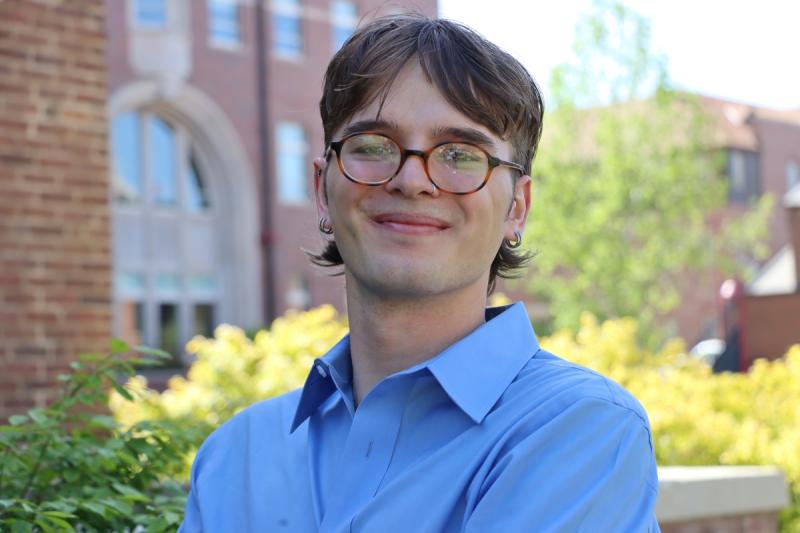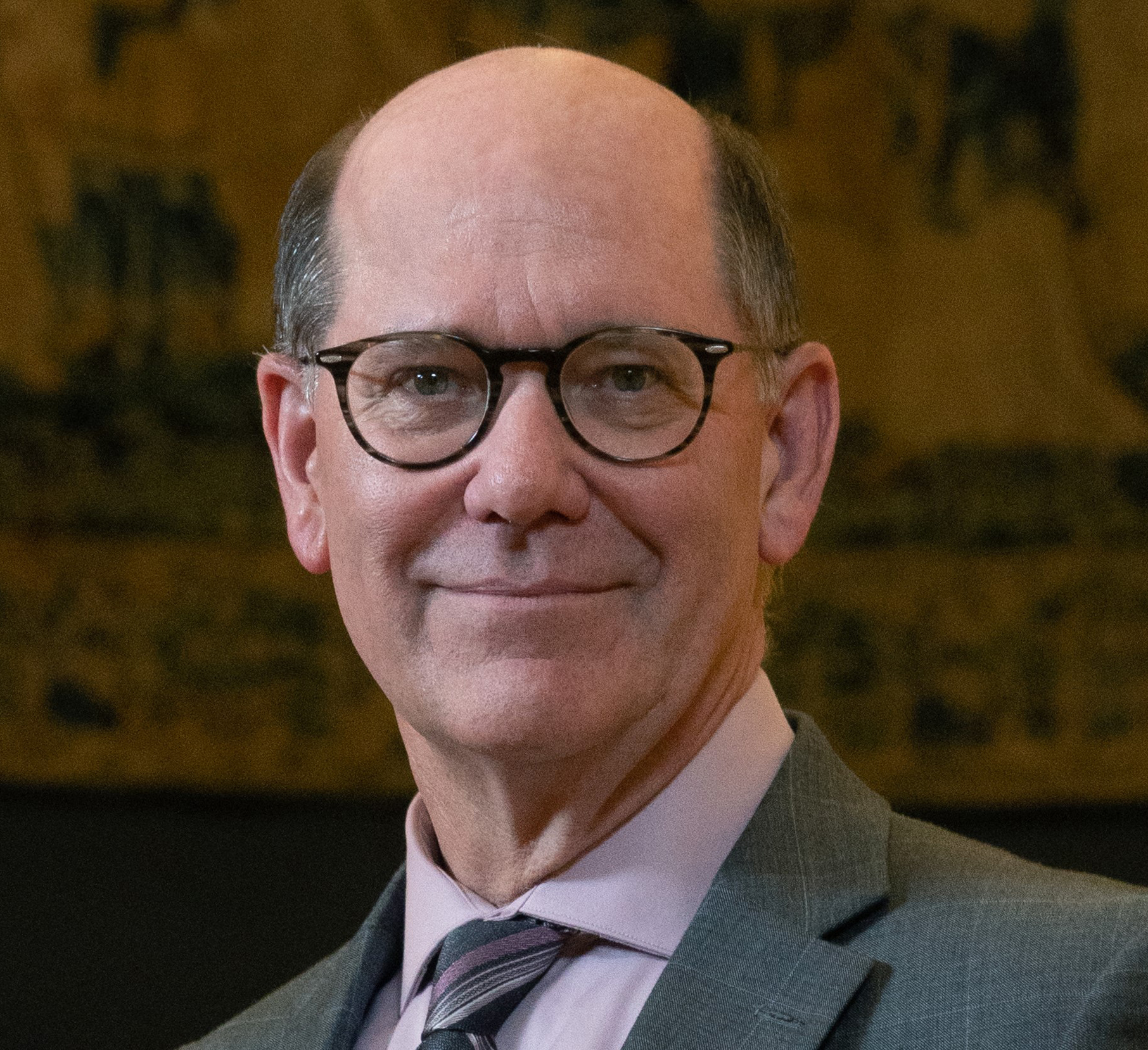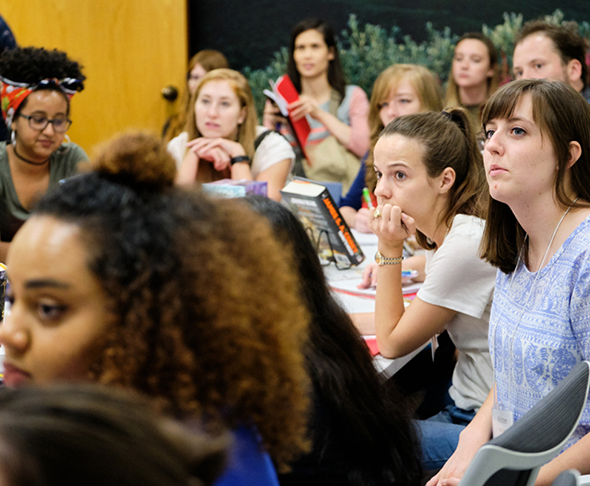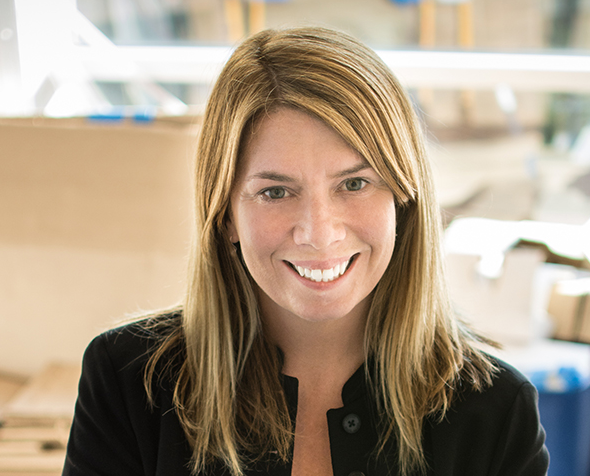Chinese Studies Opens Doors to International Travel, Service and Connection for Graduating CAHSS Student

CAHSS student Will Highfill. Photo by Hannah Fulk.
Will Highfill credits his passion for unusual places, languages and cultures to growing up as the third of four siblings in Pueblo, Colorado, deeply rooted in the rich cultural environment that his parents cultivated.
“My mom was into world literature, and we had all kinds of books and giant maps of places in the United States and other countries throughout our house,” he explained. “Although my parents were not really travelers themselves because it’s hard to travel internationally with a large family, they were incredibly interested in us learning about the world.”
Double majoring in international studies and Languages, Literatures & Cultures [in Chinese] and slated to receive a bachelor’s degree in June, Highfill had long envisioned enrolling in the University of Denver (DU) where he had frequently competed in swimming tournaments. He admired the school’s reputation for study-abroad programs and international studies. Receiving the prestigious Boettcher scholarship, which provides a full ride to any college within Colorado, made the decision easy.
To fulfill Korbel's international studies major requirement to take two years of language courses in the College of Arts, Humanities & Social Sciences (CAHSS), Highfill chose Chinese. “I came from a high school where the only language options were Spanish or French so, I was blown away by how many languages CAHSS offers,” he said. “When I saw Mandarin Chinese — arguably the hardest language in the world — I thought, I might as well try it,” he added laughing.
COVID-19 compounded Highfill’s Chinese-learning challenges, especially during the shift to online learning in winter 2022. “But my exceptional professor Ping Qiu was incredibly supportive and took time with each of us from the beginning; writing characters, learning the alphabet and separating it from English in our heads,” Highfill said. “I stuck with it because all the professors in the Chinese program bent over backwards to meet you where you were.”
He considers his fellow Chinese majors who started with him as equally vital to his success. “You take all the same classes and form a little family, which was especially helpful when we had to be online and allowed us to meet and study together outside the virtual classroom.”
Sophomore year, Highfill learned he had fulfilled his language requirement and could choose to stop learning Chinese or enroll in a three-and-a-half-month study-abroad immersion program, enabling him to earn enough credits to major in Chinese and finish up when he returned. Highfill jumped at the opportunity.
He discussed the pros and cons of enrolling in the Chinese immersion program in Taipei, Taiwan, versus Beijing with his parents. “There was a lot of tension between the United States and China at the time and we talked about being safe and about my being gay.”
He chose DU’s program offered through CET Taiwan, partnered with National Taiwan University. “In Taipei City they have one of the largest pride organizations in the world,” he said. “It’s very forward-thinking and was a perfect place for me to learn Chinese while also being myself.”
The rigorous program included five hours of Chinese instruction five times a week with an additional elective course twice weekly. To fulfill the latter, Highfill chose an international studies class that provided a deep dive into the complex relationship between mainland China and Taiwan.
“There’s nothing that can replace being in a learning atmosphere with a professor who had grown up in that situation and also studied in Beijing,” Highfill said.
Students stayed in dorms with DU and local Taiwanese roommates. The latter served as host siblings and kept them accountable with speaking Chinese. Immersed in the language, Highfill’s fluency skyrocketed.
Unfamiliar with the traditional Chinese characters used in the Taiwanese program versus the simplified Chinese Highfill had learned at DU, he had to relearn the alphabet from the beginning.
“The first four weeks were particularly painful, but the Taiwanese people are incredibly helpful to foreigners trying to learn the language,” he said. School children approached him and his roommates on the bus, speaking to them and switching to English when they couldn’t respond. “The Taiwanese are even more friendly and outgoing than Americans and always made you feel like you fit in.”
He still dreams about Taipei’s food — “vibrant, affordable and everywhere you looked,” he said. “The night market culture is electric with neon lights and sizzling fried scallions and tofu were an easy-to-grab treat. But my favorite was deep-fried squid served in little boxes like McDonald’s fries for only a dollar, or two.”
Highfill appreciates the way DU’s language and study abroad program “encourages you to step out of your comfort zone.” The immersion experience infused him with the confidence “that I could travel anywhere in the world and learn to speak the language.”
He has nothing but praise for the support he received from his thesis advisor Assistant Professor Wayne Yeung. “He was able to set up an independent study project so I could conduct research in modern Chinese propaganda outside my thesis topic which focused more on social media within this new wave of cyber propaganda,” Highfill explained.
Yeung called working with Highfill “an absolute pleasure. Will always shows immense curiosity and dedication to strive for ever higher standards in his own work. I find his thesis project about China's online propaganda and new cyber-governance very timely and exciting.”
Active in DU’s book club “Deep Talks,” focused on reading world literature from marginalized communities, Highfill also has channeled his growing commitment to international service over the last year into an internship with RIDE International, a nonprofit organization providing study-abroad programs aimed at empowerment and community development in East Africa.
He will begin a job with the Peace Corps teaching elementary students in Lesotho, Africa, in September. “Getting this incredible college education without having to take out a loan has been the blessing of a lifetime, and I want to take a few years to give back,” he said. “Maybe not in terms of knowledge because I have a feeling these kids are going to end up teaching me more than I teach them.”
Long-term, Highfill hopes to pursue a career in international diplomacy after earning a master’s degree in international studies and development. “The Peace Corps offers great programs following service that allow you to go back to school and work with the government to fund a master’s degree at top universities.”
His undergraduate experience “made me more grounded and connected with everybody and everything and my study abroad helped me understand the connection that exists among all people. As different as we may be on the surface, we’re all the same underneath.”





